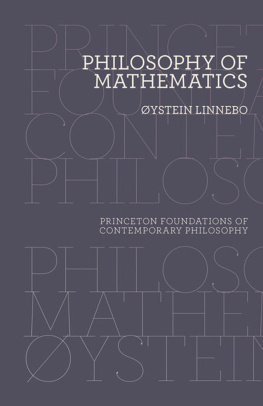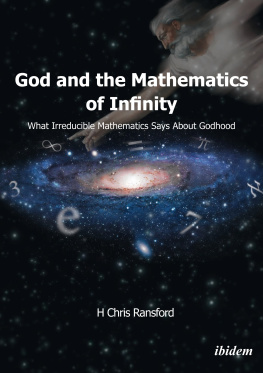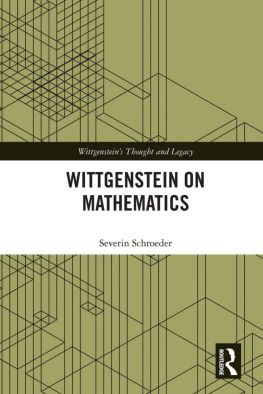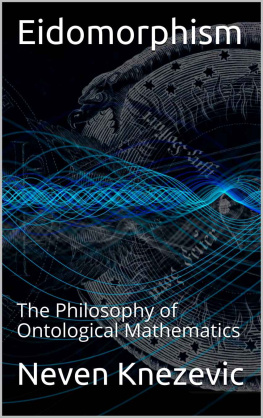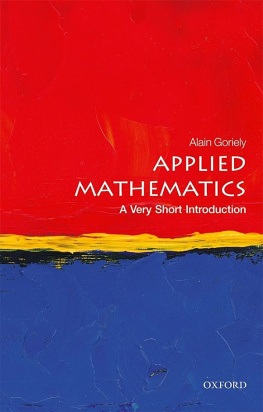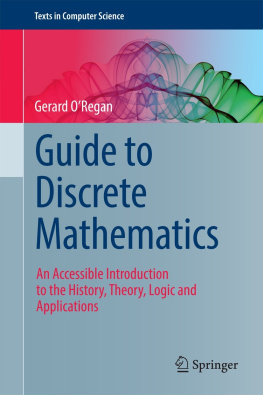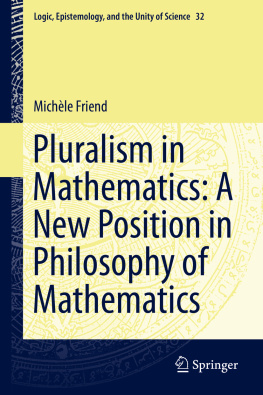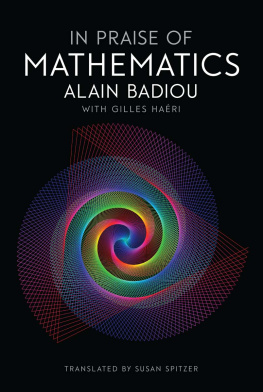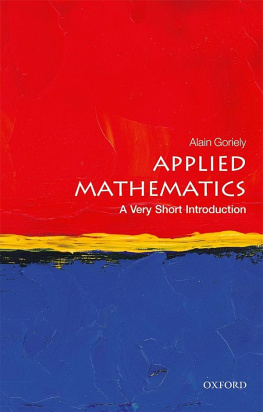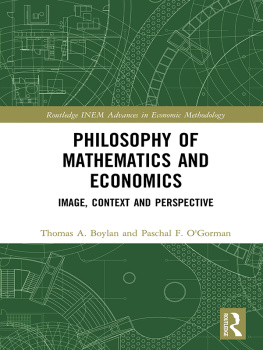
Philosophy of Mathematics
PRINCETON FOUNDATIONS OF CONTEMPORARY PHILOSOPHY
Scott Soames, Series Editor
Philosophical Logic by JOHN P. BURGESS
Philosophy of Language by SCOTT SOAMES
Philosophy of Law by ANDREI MARMOR
Truth by ALEXIS G. BURGESS & JOHN P. BURGESS
Philosophy of Physics: Space and Time by TIM MAUDLIN
Philosophy of Biology by PETER GODFREY-SMITH
Epistemology by ERNEST SOSA
PHILOSOPHY OF MATHEMATICS
ystein Linnebo
PRINCETON UNIVERSITY PRESS
PRINCETON AND OXFORD
Copyright 2017 by Princeton University Press
Published by Princeton University Press,
41 William Street, Princeton, New Jersey 08540
In the United Kingdom: Princeton University Press,
6 Oxford Street, Woodstock, Oxfordshire OX20 1TR
press.princeton.edu
All Rights Reserved
ISBN 978-0-691-16140-2
British Library Cataloging-in-Publication Data is available
This book has been composed in Minion Pro and Archer
Printed on acid-free paper.
Typeset by Nova Techset Pvt Ltd, Bangalore, India
Printed in the United States of America
10 9 8 7 6 5 4 3 2 1
Contents
CHAPTER ONE
Mathematics as a Philosophical Challenge |
CHAPTER TWO
Freges Logicism |
CHAPTER THREE
Formalism and Deductivism |
CHAPTER FOUR
Hilberts Program |
CHAPTER FIVE
Intuitionism |
CHAPTER SIX
Empiricism about Mathematics |
CHAPTER SEVEN
Nominalism |
CHAPTER EIGHT
Mathematical Intuition |
CHAPTER NINE
Abstraction Reconsidered |
CHAPTER TEN
The Iterative Conception of Sets |
CHAPTER ELEVEN
Structuralism |
CHAPTER TWELVE
The Quest for New Axioms |
Acknowledgments
I am grateful to many people for discussion of material covered in this book or comments on earlier drafts, in particular Solveig Aasen, Jens Erik Fenstad, Dagfinn Fllesdal, Peter Fritz, Leila Haaparanta, Bob Hale, Mirja Hartimo, Richard Heck, Leon Horsten, Toni Kannisto, Frode Kjosavik, Charles Parsons, Agustn Rayo, Stewart Shapiro, Wilfried Sieg, Hans Robin Solberg, James Studd, Mark van Atten, Crispin Wright, and two anonymous referees. The book has been shaped by courses on the philosophy of mathematics that I taught at the universities of Bristol, London, and Oslo. Thanks to all of my students for their reactions and feedback, which were of great help when designing and eventually writing the book. Most of the writing took place during a period of research leave at the Center for Advanced Study, Oslo, whose support I gratefully acknowledge.
Philosophy of Mathematics
Introduction
MATHEMATICS RAISES A WEALTH of philosophical questions, which have occupied some of the greatest thinkers in history. So when writing this book, some hard choices had to be made.
Let me begin with the aim of the book. Its target audience are advanced undergraduates and graduate students in philosophy, but also mathematicians and others interested in the foundations of one of the most successful, but also most puzzling, human endeavors. For the most part, the book does not presuppose much mathematics. Knowledge of elementary logic, the number systems from the natural numbers up through the reals, and some basic ideas from the calculus will be plenty for all except two late chapters devoted to set theory. While some familiarity with the philosophical mode of thinking will be a clear advantage, I have attempted to explain all relevant philosophical concepts.
I make no attempt to hide my own views concerning what is important and what works. Accordingly, my discussion has some general themes that serve to distinguish it from other introductions to the subject. First, Frege figures prominently in the book, both through his own views and his criticism of other thinkers. While my views often differ from Freges, I share his fundamental conviction that mathematics is an autonomous science. Like other sciences, mathematics uses a meaningful language to express truths, ever more of which are discovered. Yet mathematics differs profoundly from the paradigmatic empirical sciences concerning the nature of its subject matter and the methods it employs. Following Frege, I am critical of any kind of formalism or fictionalism that deprives mathematics of its status as a body of truths, and of any attempt to assimilate mathematics to the empirical sciences. Frege famously defended the objectivity of mathematics. Just as geographers discover continents and oceans, so mathematicians explore numbers and sets. The two kinds of object are equally real and are described by equally objective truths.
A second theme of the book is how to understand the objects (such as numbers and sets) that mathematics explores. I pay more attention than is customary to the question of whether mathematical objects can be accepted without fully embracing a so-called platonistic conception of them. So I discuss some less demanding conceptions of mathematical objects. Might these objects be explicable in terms of a network of objective mathematical truths? Or might they be constructed by us? Or might they exist only potentially, not actually?
A final theme concerns mathematical knowledge. This knowledge must be explained in a way that links up with the subject matter of mathematics. It is not just an accident that our mathematical beliefs tend to be true. We would like to know why. What is it about our ways of forming mathematical beliefs which ensures that most of the beliefs correctly represent their subject matter? The answer must draw on an account of mathematical evidence. So what evidence do we have for our mathematical beliefs? A variety of answers have been proposed. Perhaps the evidence is logical or conceptual, or broadly perceptual in character, or of some indirect form that flows from mathematical principles ability to explain and systematize knowledge already established. My approach to the question of mathematical evidence will be pluralist and gradualist. That is, one form of evidence need not exclude another. And evidence may come in degrees, such that the elementary parts of mathematics enjoy a higher degree of evidence than the more advanced parts, especially those of a highly set-theoretic character.
Space considerations have forced me to downplay some issues to make room for a proper discussion of the themes just described. There is no systematic discussion of the philosophy of mathematics before Freges pioneering works of the 1880s and 1890s. I give only the briefest of introductions to Platos and Kants views on the subject. Traditional geometry receives little attention. Other important topics receive none. Examples include Wittgenstein on mathematics, explanation in mathematics, the philosophy of mathematical practice, the use of experimental
The first seven chapters cover topics that tend to be included in any good course in the philosophy of mathematics. The last five chapters discuss more recent developments. These chapters are more specialized and somewhat more demanding, both mathematically and philosophically, but are largely independent of one another (except for ).
Useful introductions to these topics can be found in Rodych (2011), Mancosu (2015, 2008), Baker (2015), and Awodey (2014), respectively.
CHAPTER ONE
Mathematics as a Philosophical Challenge
1.1 PROBLEMATIC PLATONISM
Mathematics poses a daunting philosophical challenge, which has been with us ever since the beginning of Western philosophy.
Next page
